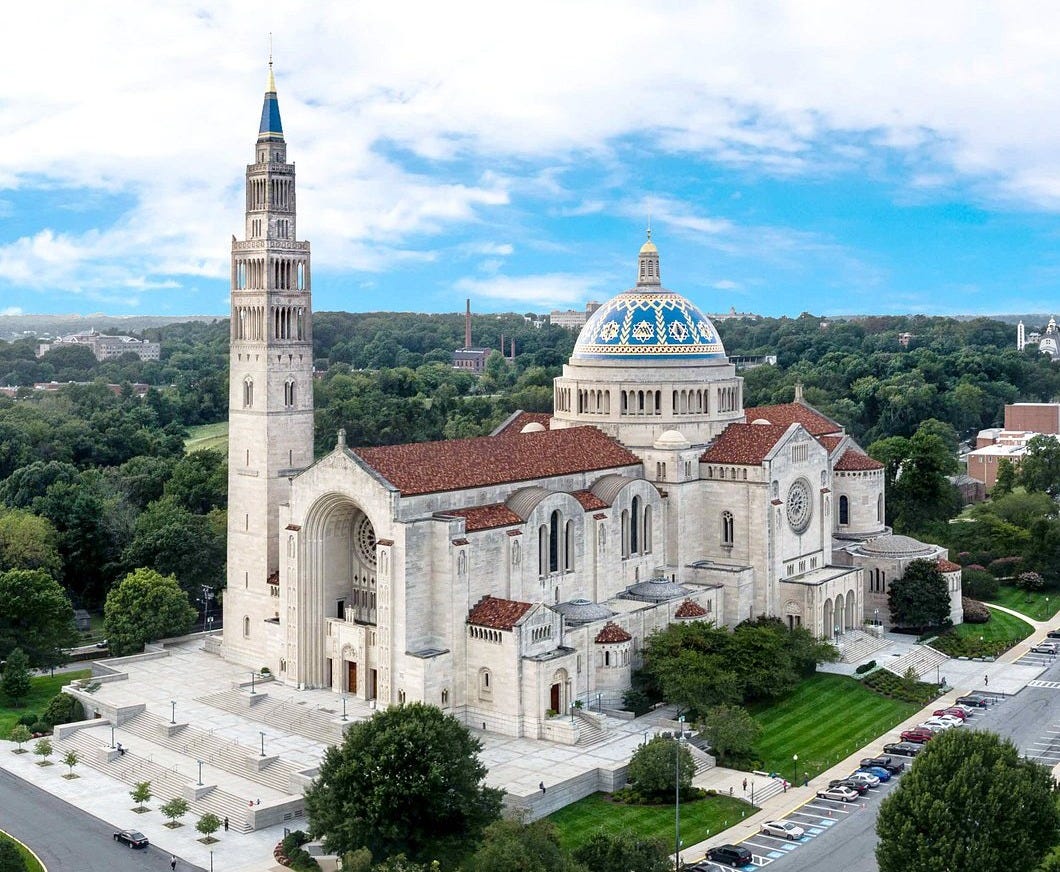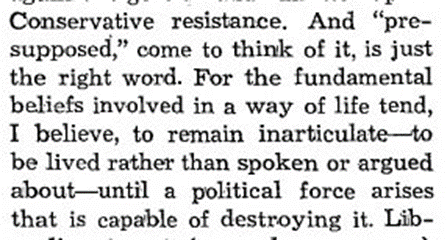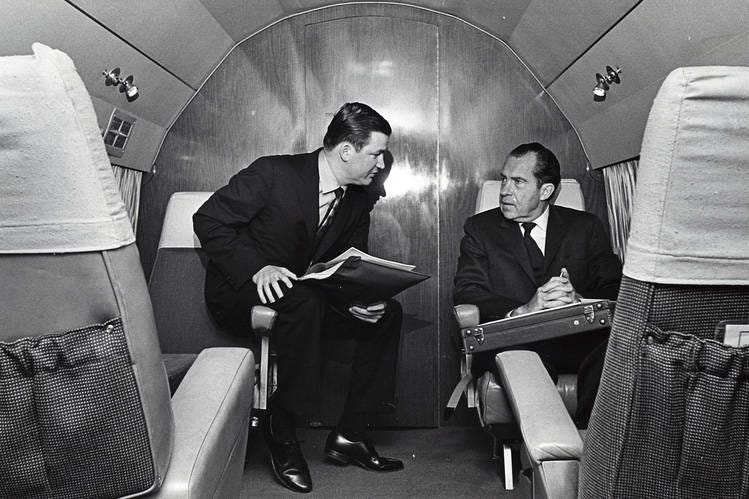[A few weeks ago I wrote a piece for The Bulwark examining the internal politics in the early years of National Review as they debated whether to endorse presidential candidates. The arguments made by the various editors and staff lay out in a very clear manner the challenges those with pretentions to ideological leadership face. There may be some lessons for today. It was a very fun piece to write and was based on some quite extensive archival work. Check it out here.]
Disentangling the intellectual threads that make up the intellectual mélange of conservatism is exhausting. It’s possible to say something true about some conservative thinkers and writers may not necessarily be true of others. In large part this is because “Conservatism” is an umbrella term that refers, more or less, to a specific outlook, but is also an umbrella term encompassing much of the American right. Some of this confusion is down to conservative institutions insisting these ideas all hang together in some way. There are overarching insights to be had, certainly, but at least in the realm of ideas careful parsing is often needed or exceptions highlighted.
The following observations are largely about part of the American conservative project who we often call “traditionalists.” Russell Kirk is the preeminent example, but Rod Dreher is a present day instance of this strain of thought. In some respects, these thinkers have most authentic claim over the term “conservatives” in that they, at least at one stage or another, had something – a tradition or set of traditions – they wanted to conserve – usually religious faith and practice. A traditionalist can only exist when a tradition is challenged. Otherwise they are simply a participant in something that is the norm, justified by conventional wisdom. The validity of unchallenged traditions is taken for granted. Only when a tenet or practice is challenged do people arise to consciously justify or defend it, either through old or new arguments or appeals to authority. The idea that traditionalism (or conservatism) only exists in the face of challenge is not original. It’s a key insight in Corey Robin’s work, but also in Willmoore Kendall’s theorizing of conservatism.
As a result, traditionalists usually write either shrilly and urgently, in a time of crisis, or about a time since past, either with nostalgia, resignation or despair. Russell Kirk had to be talked out of calling his most famous book The Conservative Rout because it is precisely this sort of chronicle of defeat. The paleoconservative pol Pat Buchanan’s memoir, Right From The Beginning, strikes all of these notes. On the mid-century Catholic Church that formed him, he writes: “It was a magnificent institution in a splendid era; but that old Catholic Church, militant and triumphant, lives only in the recesses of memory. And yet, as Peter responded when asked, “And will you, too, leave?” “Where else shall we go, Lord? Thou hast the words of eternal life.””
The beautiful things discarded or destroyed can be challenged from outside, by largescale and impersonal forces or by concerted intellectual or political attack, or from within, by faithless or weak custodians. Buchanan again: “But the legacy was squandered by those to whom it was entrusted.” Those “coffeehouse clerics” cared more about social justice than immortal souls. “The Catholic Church of the 1950s was not taken from without; it was surrendered from within.”
I increasingly think one of the ways of understanding the conservative project – especially but not exclusively the traditionalists within it – is in relation to modernity. By modernity, I mean the enormous, global (but especially European and North American) transformation that began, depending who you ask, in the 16th century but reached its apex in the high modernity of the 1950s and 1960s. Modernity entails a trend toward rationalization. This tendency plays out in every sphere, and leads to a series of linked phenomena: the domination of the scientific method as the producer of knowledge and truth; technological and technocratic approaches to problems; rationalization in economics; industrialization; standardization; urbanization and geographic mobility; mass literacy; secularization; mass culture; and mass politics.
Critically, for conservatives, this cluster of linked trends eroded faith in the legitimacy of existing hierarchies as they were exposed to rationalist critique. This is not to say that at the onset of modernity all hierarchies collapsed at once. Far from it. But once you reject the Divine Right of Kings or the Great Chain of Being – or assert the Death of God – the other bases of social hierarches – racial, gendered, religious, and so on – seem suddenly more vulnerable. Of course, it is possible to reassert or create new hierarchies grounded on scientific or pseudoscientific terms, such as the race science and eugenics of the progressive era (and later). But in the main, I would argue modernity poses challenges at least for traditionalist conservatives.
For similar reasons, modernity also weakens thick bonds of identity. Rationally speaking, why should we favor a member of an in-group over an out-group? Especially if the faith that binds us is questionable or the symbol that unites us is debunked. Or, more concretely, it’s hard to maintain the community sense of a village in a bustling city over the long-term as waves of migrants move in and out of the neighborhood.
In politics, modernity militates toward centralization as the state becomes larger and more complex. The state grows because technology allows it to. Telegraphs, printing presses, registries – to say nothing of computers and the internet – make possible for the modern state what emperors could only dream of. As technology makes possible a modern bureaucracy and governance structure capable of census-taking, taxation, and organization, the state becomes more capable (and citizens more “legible”). And as the state becomes more capable, demands on the state rise, especially leaders must justify themselves, at least minimally, by their performance since their mandate of heaven has been eclipsed. Through all this, the relationship between people and the state becomes more impersonal and rationalized.
Conservative intellectuals, I think, represent a series of men (usually men) intellectualizing a larger culture grappling with – and in some respects being alienated by – modernity and the collapsing of the structures, norms, and systems they knew and understood. Intellectuals are a strange lot, and inevitably their own idiosyncrasies and pathologies are baked in. (Lord knows, Rod Dreher is a walking Faulkner novel.) Likewise, they almost always plead special cases for unequal social orders that benefit them and those like them.
I would also argue that conservatism understood this way – as anti- or counter-modern (or perhaps modernity skeptical) – is a losing game in the United States, because at bottom, the United States is a modern regime and committed, in some basic sense, to liberalism. I recognize that liberalism is not coterminous with modernity. The Soviet Union, for example, is a striking example of high modernity. That said, liberalism is a modern doctrine, and important aspects of it are embedded in core American documents to which Americans or their leaders swear fealty.
Conservative intellectuals from Kirk to Adrian Vermeule have faced the criticism that their ideas are un-American. They fantasize after kings and established churches of Britain and the Holy Roman Empire. So many conservatives have labored to find conservatism in the American political tradition, and equate the American way of doing politics with the conservative right. It’s been a tremendously successful effort.
Yet, the liberal ideas built into the official political tradition of the United States – all men created equal; separation of church and state; freedom of speech; life, liberty, and the pursuit of happiness – created potent and often authoritative symbols for demolishing traditions. An extraordinary amount has been written about what the Founders really meant and how it should be understood, but I don’t think it’s surprising that regime wrought by the liberal (and republican), early modern Founders would broadly follow the trajectory of other modern liberal states.
I don’t want this to sound like a whiggish story. I am well aware that the story of freedom and equality in the United States for most Americans is a jagged and incomplete one, and it does not always bend toward justice.
Rogers Smith convincingly argues that liberalism is not enough to understand the American political tradition. Alongside liberalism (and republicanism) is what he calls ascriptive Americanism – the manifold and varied claims and justifications for inequality and hierarchies from across the United States. Many of these are premodern, but many, he shows, are not, highlighting pseudoscience of Jim Crow and racial exclusion laws of the progressive era. He points out, too, that if we expected American history to be the continual playing out of liberal symbols, then we would expect the Reconstruction era to have led to greater Black equality and freedom, not a retrenchment of white supremacy. Even so, while Smith argues for understanding America’s political tradition as including this potent strand of ascriptive Americanism, he affirms that liberalism is a powerful, even dominant discourse.
Two strategies conservative intellectuals have made to deal with the presence of liberalism in America. One is to make useable interpretations of varying degrees of plausibility about the meaning of the American political tradition, including its liberal aspects. This is Hillsdale and the Claremont Institute’s bread and butter, but it’s central to the conservative project. Such interpretations provide proof texts for first principles, just-so stories and declension narratives, and explain away the liberal elements of the American tradition. But the logic of the tradition is against them here as, I think, people like Patrick Deneen and other post-liberals have recognized. Hence some of their meanderings into pre- and post-modern authoritarian justifications.
Instead, there is much happier hunting for conservatives in the lived history of the United States, divorced from the stated principles of its marquee documents. In Smith’s ascriptive Americanism, which often contained premodern elements. Ascriptive Americanism in its many forms is often inegalitarian, and defenders often justify it through complex and rich ideologies.
The mid-century Catholic Church of Buchanan’s youth obviously occurred distinct from but nonetheless alongside high modernity. It evidently provided real sustenance and succor to many, but also wilted in the acid rain of the 1960s. Vatican II may have precipitated the Catholic ghetto’s decline, but its speed suggests to me the post-conciliar changes were a sharp course correction that met pent-up if unrecognized demand. For more extreme examples, see Spain, Portugal and Ireland. To me, it’s easy to understand why some lament the passing of totalizing institutions like the Church. They provided structure, community, purpose (earthly and beyond), and salvation. At the same time, the Church allowed or even encouraged abuse, rigidity and stultification that cannot be ignored.

Twentieth and twenty-first century conservative intellectuals have defended ascriptive hierarchies, and they have often done so in terms of the American political tradition and the conservative interpretation(s) of liberalism. The locus classicus of this is using arguments states’ rights, the free right of assembly (and not forced assembly), or simply opposition to state compulsion of thought or feeling to defend, if not always excuse, anti-Black segregation.
Some additional thoughts related to this line of thinking. The aspect of liberalism over which the conservative intellectual movement (including its libertarian branch) has staked greatest claim – the market – has been an important unifying device for the movement. Even so, the market has never mustered great enthusiasm from traditionalists, and they have had diminishing returns from the focus on free enterprise (to the extreme bitterness of some). Unsurprisingly, though, conservatives made the greatest headway in premarket policy and electoral politics that emphasize economic freedom and individual liberty – I would argue because it comports with the basic stuff of the American political tradition.
Similarly, it may be that part of the reason republican constitutionalism has been such an important framework for the conservative movement is that reconstructing the world of the Founders finely balances modernity and non-modernity. The constitutional order represents an early modern, Enlightenment regime, but one grounded contextually in an environment replete with pre-modern institutions and beliefs. It’s modernity before it went too far. In this respect, it’s something amenable to both traditionalists and libertarians: the pre-modern and hyper-modern branches of the conservative movement.
There is part of me, too, that wonders whether the specific appeal of Donald Trump is pre-modern. Efforts to intellectualize Trumpism as populist nationalism notwithstanding, he offers personalist rule, irrationalism, and illiberal toughness. Fritz Stern writing about German intellectuals said:
They were more than the critics of Germany's cultural crisis; they were its symptoms and victims as well. Unable to endure the ills which they diagnosed and which they had experienced in their own lives, they sought to become prophets who would point the way to a national rebirth. Hence, they propounded all manner of reforms, ruthless and idealistic, nationalistic and Utopian. It was this leap from despair to Utopia across all existing reality that gave their thought its fantastic quality…
Their despair over the condition of Germany reflected and heightened the despair of their countrymen, and through these men we can see the current of disaffection rising until it merged with the nihilistic tide of national socialism.
Stern went on to link this mind-set with American conservatism in the 1960s. This was an overreaction; I am less sure of that today.
What I’m reading:
If I’m reading genre fiction, I usually want it to be space opera. I have finally succumbed and started James S. A. Corey’s The Expanse series, beginning with Leviathan Wakes. It’s a lot of fun.
I’m very excited to start Jerome Copulsky’s American Heretics, especially for the chapter on L. Brent Bozell.





One thing I've noticed in traditionalist conservatives is more intellectualism than intellect. Not that they're stupid guys, but their reach--their intellectual ambition--is often far beyond their grasp. Russell Kirk may be the best example of this. Rod Dreher is another; Buchanan a third. Garry Wills is an absolutely first-rate intellect, but his traditionalism is a wavering one.
(Btw, casting Buchanan as the anti-Wills is brilliant!)